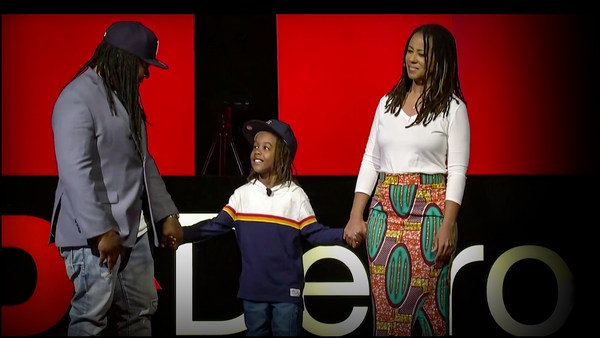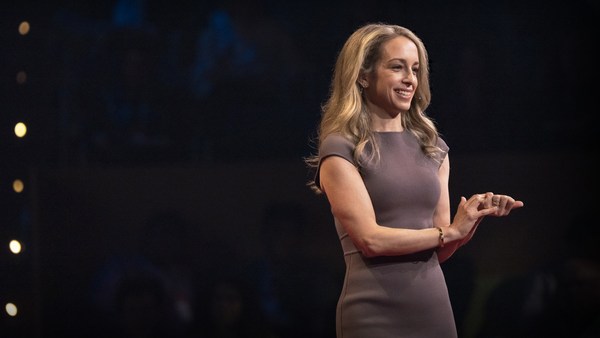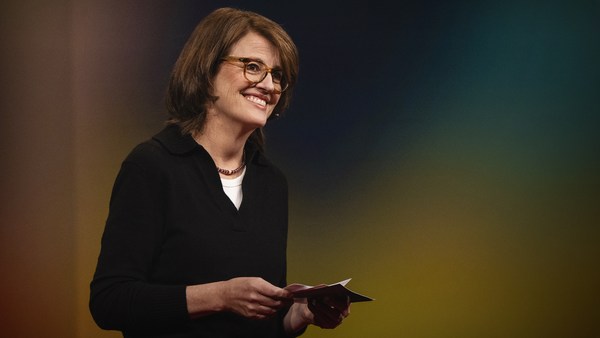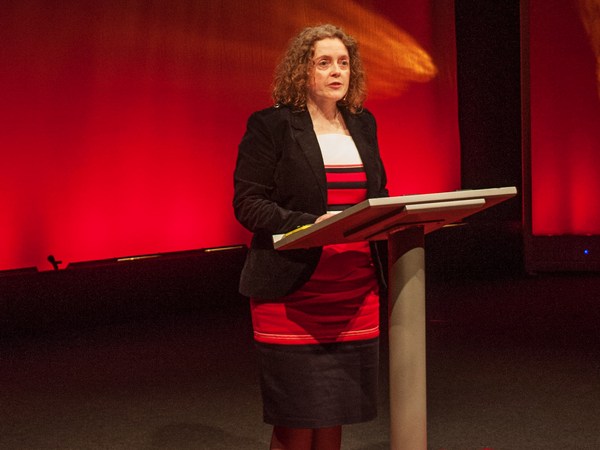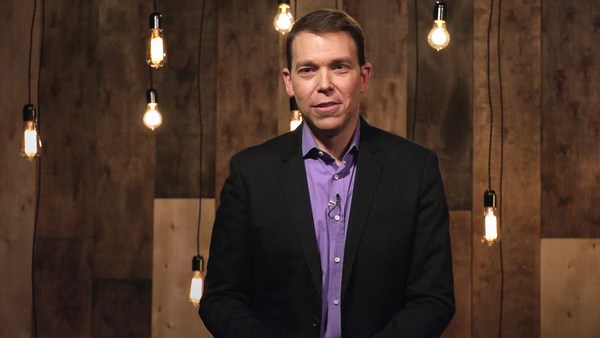It should have been the happiest day of my life. It was my wedding day, but there was a part of me that just couldn't wait for it to be over. And not because I didn't want to marry Ben. I did, I really did. But because both my parents were there, and I was the byproduct of a high-conflict divorce.
In 25 years, my parents had been in the same place at the same time maybe half a dozen times. "Acrimonious" is euphemistic. But my parents' divorce doesn't make me unique or special. 40 to 50 percent of first marriages end in divorce, impacting half a million kids in the US every year. And we know the reputation that divorce has for devastating children. But it doesn't have to be that way.
Now fast-forward 15 years from my wedding day, and my phone rings. It's my dad. Super funky timing because I'm standing ...
(Laughter)
... in the middle of the Kohl’s intimates department during a sale, so literally both hands full of underwear. Because it’s a Kohl’s sale, so it’s three for ten, right?
He says, "How's it going?" And I just blurted it out.
I said, "Dad, I failed. Ben and I are getting divorced, and I am terrified about money, where I'm going to live and now how I'm going to get health insurance."
And you know what he said? "Don't worry, Al. Get a good lawyer. You'll be fine."
But I didn't want a lawyer. And I didn't want to fight. I wanted it to be different for my kids than it was for me. I wanted both their parents at teacher conferences and in the stands, watching them play hockey, lacrosse and celebrating them together at the happiest moments of their life, like the weddings and the graduations that would eventually come. And I did not want to divvy up those experiences with their dad.
Kids exposed to high conflict are likely to suffer emotional, social, behavioral and academic problems. And I can tell you those stats played out for me and my two brothers. Between us, we've dealt with addiction, eating disorders, impulsive behavior and many messed up relationships. So again, when my dad said, "Get a good lawyer," without missing a beat, it was a gut punch.
It doesn't have to be that way. I navigated my divorce, no lawyers, no mediators, using three key concepts that I teach in my work. Coincidentally, ironically, I don't know what it is, but the child caught in the crossfire of a nasty divorce became a professional that helps others manage conflict. So in my work, I teach a specific framework of conversation grounded in listening that helps leaders and teams leverage healthy conflict, improve collaboration and improve high-stakes decision making. And if you break it down, if you really think about it, that's what divorce is. It's hundreds of collaborative decisions. So we have two choices. We can leave those decisions to a judge, or we can commit to finding a path forward together.
So I use these three concepts, key concepts that I teach in my work. A vision for the future, emotional agility and a commitment to listening, first and foremost.
And I know this first step, it's going to irritate some of you, but here it is. To move forward, we have to let go of the past, let go of anger and blame. When two people come together, they create a dynamic, and sometimes it's the perfect dysfunction. But when both parties let go of blame, it levels the playing field. So from the get-go, you have to decide what you want your future to look like. Because if you have children, your ex will be in your future forever. So do you want to be eternally mired in anger and blame or ... filled with pride and appreciation, and gratitude for what you've accomplished together. When I took a deep, fearless personal inventory, I had to own my part in our dysfunction, which gave me an appreciation for the other side and allowed me to be emotionally agile in really hard conversations that came.
Emotional agility, it's critical. Without it, there is no collaboration. Because in that moment when we get triggered and our amygdala hijacks the prefrontal cortex, we get so fired up, we can't listen, we can't reason, and then we behave and we respond in ways that we wish we hadn't. So instead of lashing out with something intentionally hurtful, we have to pause.
(Exhales)
Say nothing for a moment. Maybe many moments. Recover. Shift to inquiry and commit to listening. That's emotional agility.
Here's what I mean. Ben and I triggered each other constantly throughout our process, but instead of firing back, I paused and I asked myself, "What am I missing?" And just that idea that there was something I needed to learn was enough to shift me so that I could then ask him, "What's really important to you in this?"
Now don't get me wrong, I'm not saying this is easy. This was the most difficult thing I've ever done in my life. But I didn't do it alone. We both chose to prioritize our kids over and above our anger towards each other. We chose kindness. We chose grace. It certainly didn't come by default.
But how do you give grace when you fundamentally disagree, or you are so hurt or so angry, you don't even want to hear another perspective? You have to commit to listening first. Have a dialogue. Listen to learn. We live in a world that values speaking over listening. We are taught to speak, to sell, to make our case. We are not taught to listen. We prepare for difficult conversations by mapping out exactly what we're going to say, but it's listening that inspires us to ask really good, thoughtful, open-ended questions. And then when we listen, we often learn something in those answers that shifts our perspective and opens us up to possibilities that didn't exist before. But we can't get there unless we let go of being right and let go of pushing for exactly what we want. Or in the case of divorce, what we believe we “Deserve.” And I just said "Deserve" with a capital D, because we can get so stuck in this "me" belief system that we prevent the possibility of a "we" solution.
Bottom line, divorce is not a failure and there is no shame in ending a marriage. It changes the family dynamic, but it doesn't have to destroy it. So if you have had a brutal divorce or you're currently in the midst of one, it's not too late to turn it around. And I implore you to try for the sake of your children.
I can honestly say that I have a really solid friend in my former husband now. In fact, he's sitting here with my daughter and my current husband.
(Applause)
Yeah. Ben and I talk often, mostly about our kids, our favorite topic. We share our concerns, our delights. His perspective is invaluable to me because there is no one on this Earth that loves my kids as much as I do, except for him. And I would not be standing on this stage without him as my partner in marriage and in divorce.
So this is a special shout-out "thank you" to him. I am so proud and so grateful for what we've done. So thank you, Ben, and thank you all.
(Applause)
